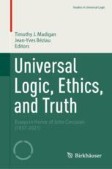Search
Search Results
-
“Logical Lantern”: Analogue of the Square of Opposition for Propositions in V.I. Markin’s Universal Language for Traditional Positive Syllogistic Theories
In this paper is constructed an analogue of the square of opposition for propositions about relations between two non-empty sets. Unlike the...

-
Many-Valued Logical Hexagons in a 3-Oppositional Trisimplex
The present paper’s aim is to construct a “3-oppositional trisimplex” (i.e., the tri-simplicial counterpart of the “logical hexagon” (1950), the most...
-
Ex Incompatibilitate Sequitur Quodlibet (The Explosiveness of Incompatibility and the Compatibility of Negation)
In this chapter, we explain why Ex contradictione sequitur quodlibet is a confusing expression to denote the statement...
-
The Oppositions of Categorical Propositions in Avicenna’s Frame
The aim of this paper is to analyse categorical propositions and their oppositional relations in Avicenna’s frame. For Avicenna’s expression and...

-
Quantifying Statements (Why ‘Every Thing’ is Not ‘Everything’, Among Other ‘Thing’s)
The present paper wants to develop a formal semantics about a special class of formulas: quantifying statements, which are a kind of predicative...

-
Two Squares of Opposition in Two Arabic Treatises: al-Suhrawardī and al-Sanūsī
The square of opposition has never been drawn by classical Arabic logicians, such as al-Fārābī and Avicenna. However, in some later writings, we do...

-
Logical Oppositions in Avicenna’s Hypothetical Logic
In his hypothetical logic, Avicenna introduces new kinds of hypothetical propositions by using quantifications ranging over situations and...
-
Turnstile Figures of Opposition
We present many figures of opposition (triangles and hexagons) for simple and double turnstiles. We start with one-sided turnstiles, corresponding to...
-
The Square of Opposition: Past, Present, and Future
We first explain the origin and development of the theory of opposition, its generalization to many concepts, and figures of opposition, particularly...
-
Tri-simplicial Contradiction: The “Pascalian 3D Simplex” for the Oppositional Tri-segment
In this paper, we deal with the theory of the “oppositional poly-simplexes”, producing the first complete analysis of the simplest of them: the...
-
No, No, and No
It is often assumed in the community of linguists that a formal logical treatment of negation is not able to account for negation in natural...
-
The Square of Opposition as a Framework for Stephen Langton’s Theological Solutions
In some texts of the prominent medieval thinker Stephen Langton (1150/55–1228), whose main theological works are being edited these days, it is...
-
The Limits of the Square: Hegel’s Opposition to Diagrams in Its Historical Context
The square of opposition hardly appears in German texts on logic from the early to mid-nineteenth century. This cannot be due to a lack of awareness...
-
On the Transformations of the Square of Opposition from the Point of View of Institution Model Theory
In recent decades, research in the square of opposition has been increased. New interpretations, extensions, and generalizations have been suggested,...
-
On the Logical Geometry of Geometric Angles
In this paper we provide an analysis of the logical relations within the conceptual or lexical field of angles in 2D geometry. The basic tripartition...

-
Is Logic Exceptional?
We examine in which sense logic can be considered as exceptional. We start by emphasizing the difference between Logic as reasoning and logic as the...
-
Things May Not Be Simple: On Wittgenstein’s Internal Relations
Wittgenstein took the Tractatus Logico-Philosophicus to be eventually invalidated by logical atomism. Our main thesis is that it can be revalidated,...

-
From Euler Diagrams in Schopenhauer to Aristotelian Diagrams in Logical Geometry
In this paper I explore the connection between Schopenhauer’s Euler diagrams and the Aristotelian diagrams that are studied in contemporary logical...
-
A Bitstring Semantics for Calculus CL
The aim of this chapter is to develop a semantics for Calculus CL. CL is a diagrammatic calculus based on a logic machine presented by Johann...
-
Existential Import, Aristotelian Logic, and its Generalizations
The paper uses the theory of generalized quantifiers to discuss existential import and its implications for Aristotelian logic, namely the square of...

